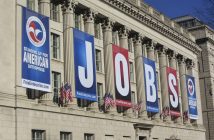The nearly 4 million college students who receive their diplomas next month will head directly into the worst job market since the 2008-2009 recession. Things are no brighter for graduates with job prospects since more than 20 percent of companies are now considering pulling employment offers. Given the economic landscape, now is the perfect moment to pull the plug on the Optional Practical Training (OPT) program.
In short, OPT which was created through the regulatory process, authorizes foreign nationals to work in the U.S. post-graduation to gain on-the-job training. But, over the past 20 years, it has metastasized into the largest guest worker program despite numerous findings of fraud, lax oversight, and bipartisan efforts to reform it. Even though it disadvantages American students, particularly STEM graduates, OPT has well-financed support among lobbyists for universities and colleges, big business and Silicon Valley.
Just as agribusiness benefits financially off of the backs of cheap, low-skilled foreign labor, OPT employers reap rewards by discriminating against American graduates. Not only is there no limit on how many OPT workers can be hired, unlike H-1B visas, there is scant oversight and fewer worker protections But the big draw is that both the foreign worker and the employer are exempt from Social Security and Medicare withholding requirements.
That means combined they receive a 15.3 percent tax discount, according to the American Workers Coalition, a group that supports ending the program. It also means, as noted by David North of the Center for Immigration Studies (CIS), that almost $2 billion was shelled out to companies during FY 2017 to hire 240,000 foreign college graduates as opposed to employing American citizens.
So nervous about losing their source of cheap labor, some of the biggest OPT beneficiaries are going to great lengths to change their hiring practices in order to secure foreign labor.
“Microsoft is creating a virtual internship experience for over 4,000 [foreign]students. Google will host online networking events and mentor sessions. Both Amazon and Qualcomm told Quartz that they are working with intern candidates and new hires impacted by travel restrictions based on their individual situations,” according to Quartz.
Colleges and universities also have reason to fight to keep OPT alive. Because foreign students pay full tuition, with no in-state discounts at public institutions, colleges receive 28 percent of their tuition revenue from the 1.1 million foreign nationals who were enrolled in undergraduate studies in the 2018-2019 school year.
The potential financial loss is why lobbyists have been in overdrive trying to bend immigration rules to the favor of foreign students whose status is jeopardized by the coronavirus pandemic. Last month, NAFSA: Association of International Educators a nonprofit promoting international education, wrote to acting Department of Homeland Security (DHS) Secretary Wolf, and Secretary of State Mike Pompeo to ask them not to consider time spent unemployed during the COVID-19 emergency against the 90 days foreign nationals are allowed to be without a job after graduating.
“Most importantly, we ask that DHS in the short term make clear that their goal is the health and well-being of all involved,” the letter reads and to “include options for nonimmigrant students, faculty, researchers, and others on campuses to remain in legal immigration status and to access or continue work opportunities.”
It is time for the President Trump and DHS to “make clear that their goal” is defending 4 million college graduates and nearly 17 million unemployed Americans.




